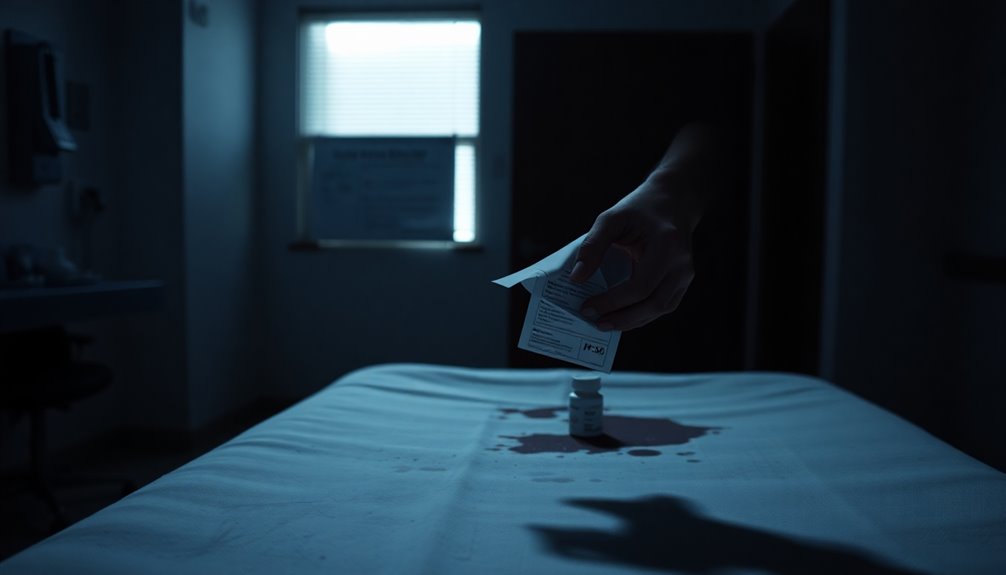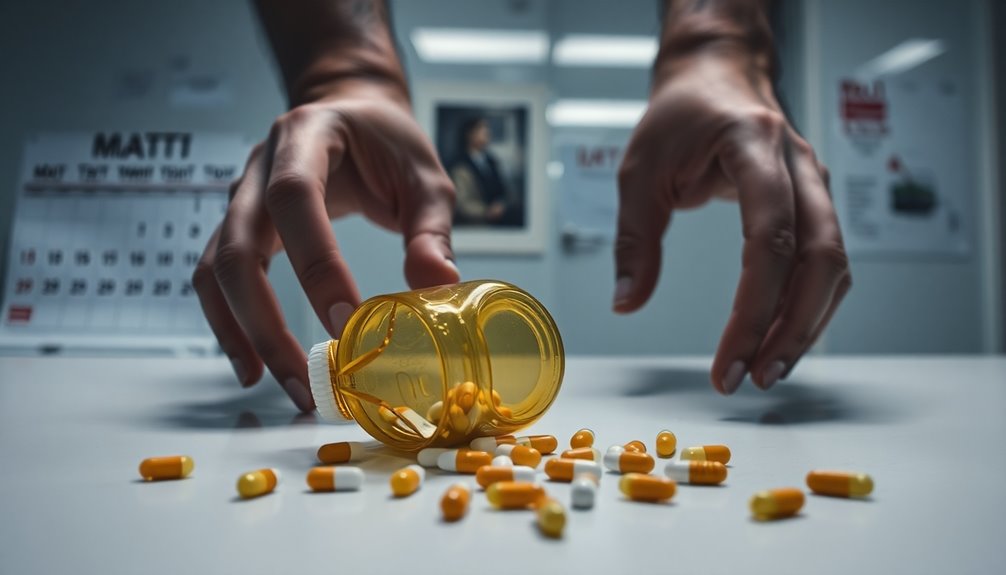When it comes to the worst sex disease, HIV stands out due to its potential to progress to AIDS without timely treatment. This virus attacks your immune system, leaving you vulnerable to life-threatening infections. Additionally, genital herpes, caused by the herpes simplex virus, can complicate your health further and increase your risk of contracting HIV. Untreated STDs, like gonorrhea and chlamydia, can lead to severe reproductive issues later on. Awareness and prompt action are crucial in combating these diseases. Stick around to uncover more about the risks and preventive measures you can take to protect yourself.
Key Takeaways
- HIV is considered one of the worst STDs as it attacks the immune system and can lead to AIDS without early intervention.
- HPV is linked to over 311,000 cervical cancer deaths annually and can cause other types of cancer, making it highly severe.
- Untreated syphilis can progress through stages, leading to serious health complications like organ damage and blindness.
- Hepatitis B can cause severe liver damage and resulted in over 1 million deaths in 2022, showcasing its severity.
- Untreated STDs significantly increase the risk of infertility, organ damage, and complications during pregnancy, emphasizing the need for awareness and treatment.
Overview of STDs

When it comes to understanding sexually transmitted diseases (STDs), it's crucial to recognize their widespread impact on global health. Every day, over 1 million curable STDs are acquired worldwide among people aged 15–49.
In 2020, an estimated 374 million new infections occurred with chlamydia, gonorrhea, syphilis, and trichomoniasis. Additionally, more than 500 million individuals in the same age group are living with herpes. Many STIs remain asymptomatic, leading to unknowing transmission among individuals.
HPV infection contributes to over 311,000 cervical cancer deaths annually. With more than 30 pathogens capable of transmission through sexual contact, awareness and education are vital.
Most Common Bacterial STDs

Understanding the landscape of STDs leads to recognizing the most common bacterial infections that pose significant health risks.
Chlamydia tops the list as the most prevalent STI in the U.S., primarily affecting teens and young adults. It spreads through vaginal, anal, or oral sex and often has few symptoms. Approximately 1 million curable STIs are acquired daily globally, highlighting the urgency of addressing this issue.
Gonorrhea, frequently occurring alongside chlamydia, affects young people aged 15 to 24, with most men showing symptoms but only about 20% of women.
Syphilis evolves through four stages, each with distinct symptoms, and can be transmitted from mother to child.
Fortunately, all these infections are treatable with antibiotics, but retesting is essential after treatment. Awareness and prompt treatment are crucial to prevent severe health issues.
Notable Viral STDs

Notable viral STDs represent a significant public health concern, affecting millions worldwide and leading to serious health complications. HIV, for instance, attacks your immune system, specifically targeting CD4 cells, and can progress to AIDS without early treatment. Over 500 million people have genital herpes, which can increase your risk of acquiring HIV and can flare up multiple times a year. HPV is highly prevalent and linked to over 311,000 cervical cancer deaths annually, alongside other cancers. Hepatitis B is another serious threat, potentially causing severe liver damage and leading to over a million deaths in 2022. Over 30 pathogens can be transmitted via sexual contact, highlighting the diverse challenges in managing these infections. Vaccines and antiviral treatments are available, but prevention remains crucial in managing these infections.
Transmission and Prevention Methods

How can you effectively protect yourself from sexually transmitted diseases (STDs)?
Start by using latex or polyurethane condoms and dental dams consistently during vaginal, oral, and anal sex. Avoid oil-based lubricants with these barriers, as they can cause breakage. Many STDs can be asymptomatic, so it's crucial to remain vigilant about your sexual health.
If you're engaging in activities like fisting, wear surgical gloves to reduce risk. Limit your number of sexual partners and practice mutual monogamy to lower your chances of exposure.
Get vaccinated against HPV, hepatitis A, and hepatitis B, and consider pre-exposure prophylaxis (PrEP) if you're at high risk for HIV.
Always get tested with new partners, and share your results to ensure both of you stay safe. Abstinence is the most reliable way to prevent STIs.
Complications From Untreated STDS

When left untreated, sexually transmitted diseases (STDs) can lead to serious complications that significantly impact your health.
For women, gonorrhea and chlamydia can cause pelvic inflammatory disease (PID), potentially resulting in infertility or ectopic pregnancies. Men aren't spared either, as untreated gonorrhea can lead to epididymitis and infertility. Additionally, untreated STDs can create conditions favorable for increased HIV risk, significantly lowering life expectancy and increasing susceptibility to opportunistic infections.
Syphilis can cause severe issues like organ damage, blindness, and increased cancer risks. Hepatitis B and C can lead to liver cirrhosis and cancer.
Additionally, untreated STDs during pregnancy can result in miscarriage, stillbirth, and serious neonatal complications. Protecting your health is crucial, as the repercussions of untreated STDs can be devastating for you and your future family.
Don't ignore the signs; seek help if you suspect an infection.
Importance of Treatment Compliance

Ignoring the signs of sexually transmitted diseases can lead to serious health complications, but addressing these infections through proper treatment is just as important. Treatment compliance ensures you receive the correct care, which includes accurate diagnosis, effective medication, and essential health education. Following standardized treatment protocols helps reduce antimicrobial resistance and guarantees you get adequate care at any health service level. Effective treatment as a public health measure can help control STI transmission rates, improving overall community health. High adherence rates improve your chances of recovery, while follow-up support can significantly boost your commitment to treatment. Remember, combining treatment with preventive measures, like condom use, is key. If you face privacy concerns, reach out to a healthcare provider who understands and respects your needs. Your health depends on staying compliant with your treatment plan.
Frequently Asked Questions
Can STDS Affect Mental Health and Relationships?
Yes, STDs can significantly affect your mental health and relationships. You might experience feelings of shame, anxiety, or depression after a diagnosis, which can strain your self-esteem and lead to isolation.
The fear of rejection can make it hard to communicate openly with partners, worsening relationship dynamics. Seeking support from friends, family, or professionals can help you cope.
Educating yourself about STDs can also reduce stigma and improve your emotional well-being.
What Are the Symptoms of STDS to Watch For?
When you're concerned about STDs, it's crucial to watch for symptoms like sores, bumps, or rashes in the genital area, along with itching or burning sensations.
You might notice unusual discharge or pain during urination.
Pay attention to abdominal or lower back pain, fever, and swollen lymph nodes, too.
If you experience any of these signs, it's essential to consult a healthcare professional for proper testing and treatment.
Are There Home Testing Kits for STDS?
Yes, there are home testing kits for STIs.
You can find kits that test for common infections like chlamydia, gonorrhea, and HIV, often through urine or blood samples. Many reputable companies, like Nurx and myLAB Box, offer these.
You'll typically collect your sample at home and mail it to a lab. Results usually arrive within a few days.
Just remember, if you get a positive result, follow up with a healthcare provider for confirmatory testing.
How Do I Discuss STDS With My Partner?
When you discuss STDs with your partner, be open and honest. Start by sharing your thoughts and concerns calmly.
Use clear language and encourage questions. It's important to talk about your sexual history and any testing you've had.
Suggest getting tested together for peace of mind. Remember, STDs are common and manageable, so approach the conversation without judgment.
Keep communication open and supportive as you navigate this together.
What Should I Do if I Suspect I Have an STD?
If you suspect you have an STD, don't wait—contact a healthcare provider or a sexual health clinic right away.
It's crucial to report your symptoms and sexual history for accurate diagnosis. Avoid all sexual activity until you've been tested.
Expect lab tests, like blood or urine samples, to confirm the infection. Once diagnosed, inform your partners so they can get tested too.
Conclusion
In conclusion, staying informed about STDs is crucial for your health and well-being. By understanding the different types, how they spread, and the importance of prevention, you can take charge of your sexual health. Don't ignore symptoms or skip treatment—compliance is key to avoiding serious complications. Regular check-ups and open communication with partners can help you stay safe. Remember, knowledge and proactive measures are your best defenses against the worst sex diseases.










